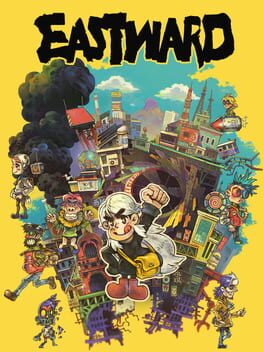Video games as a whole aren't good at conveying tragedy. Tragedies can be featured as a plot device or to serve as narrative motivation, but it's not often that they stick with me beyond those purposes. I'm sad Character died but at least it propelled the story or made Other Character's arc more emotionally rich and satisfying.
In contrast, Eastward is honestly kind of mean in how deeply dark it's willing to go. Not in a cheap or exploitative sense, but in a way that makes you feel the true depth of sadness when the last thing you want to happen happens.
There's a moment a few hours in where the story takes a turn that isn't uncommon in games, but feels so much more powerful here. And once that had occurred, I spent the rest of the game with a hole in my stomach, constantly on edge, knowing to take nothing for granted. The game, like life, carries on but also doesn't. You end up irrevocably changed in some way and everything you experience from that point forward is through a prism of guilt and fear.
Eastward is so cute and fun and offers such a rich variety of moods and gameplay styles, so it feels unfair to speak about it in terms of tragedy, of how deftly it depicts grief and guilt. But the moments I can't shake are the ones where it went for my heart. I suppose because it felt more genuine that I'm used to experiencing in games, using common tropes and twisting them further. Its horror felt distressingly normal, like similarly heart-wrenching moments from To the Moon or Undertale. Not fuel for plot momentum, but as moments of actual loss and emptiness.
It also has so many cute and fun moments, made all the cuter and funner when contrasted with the brief moments of heartbreak.
In contrast, Eastward is honestly kind of mean in how deeply dark it's willing to go. Not in a cheap or exploitative sense, but in a way that makes you feel the true depth of sadness when the last thing you want to happen happens.
There's a moment a few hours in where the story takes a turn that isn't uncommon in games, but feels so much more powerful here. And once that had occurred, I spent the rest of the game with a hole in my stomach, constantly on edge, knowing to take nothing for granted. The game, like life, carries on but also doesn't. You end up irrevocably changed in some way and everything you experience from that point forward is through a prism of guilt and fear.
Eastward is so cute and fun and offers such a rich variety of moods and gameplay styles, so it feels unfair to speak about it in terms of tragedy, of how deftly it depicts grief and guilt. But the moments I can't shake are the ones where it went for my heart. I suppose because it felt more genuine that I'm used to experiencing in games, using common tropes and twisting them further. Its horror felt distressingly normal, like similarly heart-wrenching moments from To the Moon or Undertale. Not fuel for plot momentum, but as moments of actual loss and emptiness.
It also has so many cute and fun moments, made all the cuter and funner when contrasted with the brief moments of heartbreak.
